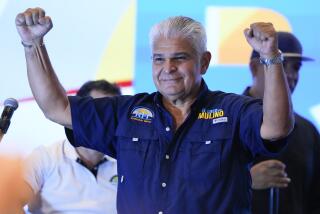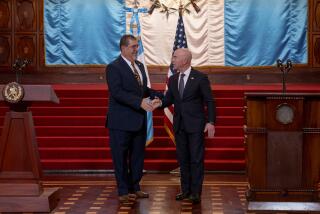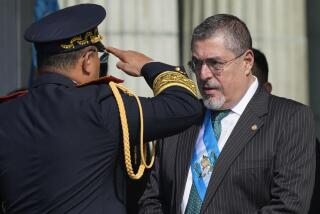Center-left candidate wins in Guatemala
- Share via
GUATEMALA CITY — Alvaro Colom, a center-left businessman, won Guatemala’s presidential election Sunday in a vote that was in many ways a referendum on this country’s fragile and besieged democracy.
Colom, 56, defeated former army Gen. Otto Perez Molina, an officer during the bloody dictatorship and counterinsurgency warfare of the 1980s.
With 97% of the vote tallied, Colom led Perez Molina by 52.8% to 47.2%. Nearly all of the uncounted votes were in Colom’s provincial strongholds.
Across Guatemala, turnout was light for the runoff, after a nasty campaign that centered on a single issue: the crime and corruption that have characterized Guatemala’s democratic institutions under civilian rule.
Perez Molina, also 56, promised to crack down on crime with a “firm hand” (mano dura in Spanish), a phrase commonly associated in Latin America with authoritarian government. Campaign posters showed him with a raised fist and stern expression.
Victor Galvez, a political analyst here, said the result showed Guatemalans rejected Perez Molina’s rightist solutions to their country’s problems. “It’s a message that people don’t want to return to the military past,” he said. “In the end, the firm hand turned against Perez Molina.”
Colom, a former industrial engineer with a long government resume but little charisma, sought to make Guatemala’s poverty the focal point of his campaign.
“I voted against injustice, with the poor,” said Max Perez, a 34-year-old painter in the colonial city of Antigua. “I voted for these people who live in misery, for the people who are hungry. I voted for the engineer Alvaro Colom.”
Perez Molina led in most preelection polls as Colom struggled in the face of repeated and highly personal attacks, many linked to corruption charges dating from his last run for the presidency in 2003.
A slew of anonymous fliers and e-mails accused Colom of a variety of mortal sins, including links to drug cartels. He even felt compelled to issue a news release explaining that his study of Mayan religious rites did not mean he was an agent of the devil.
Colom struck back by suggesting that Perez Molina would trample on civil liberties and return the country to a dark, authoritarian past, a theme that civil rights groups picked up.
“The two of them were hitting each other hard,” said Jaime Lobos, 39, a delivery driver who voted just across the street from Guatemala’s Congress building. “They both went too far.”
Colom won a narrow plurality in the first round of voting in September. But with just 29% of the vote in a 14-candidate field, he fell far short of the majority needed for outright victory.
At least five dozen campaign workers and officials were killed this year. Analysts say many of the killings were carried out by drug traffickers trying to increase their influence in local governments.
Across Guatemala, homicides claimed more than 5,600 lives last year. Organized crime groups are said to wield influence in the police, Congress and judicial and penal institutions.
“It’s obvious that the recent civilian governments have failed,” said Francisco Garcia of the Central American Institute of Political Studies.
In a voting center on the edge of El Gallito, a crime-ridden neighborhood near the center of Guatemala City, people had differing opinions on which of the two candidates might be the country’s savior.
Drug dealers often transform the neighborhood into a battleground. Soldiers recently installed a makeshift base at the local market, where they stand behind barricades of sandbags in an attempt to keep the local gangsters under control.
“There have been many, many killings here,” said Ingrid de Santos, 39, explaining her vote for Perez Molina. “The army has made things better.”
But 57-year-old trucker Jose de la Cruz saw things differently. “They say he might become another dictator,” he said of Perez Molina. “I wanted to vote for him, but I couldn’t.”
Crime is less of a problem in rural areas, and support for Colom was strong in provincial Guatemala and among its Maya population. Perez Molina won handily in Guatemala City, but lost in 19 of the country’s 22 provinces.
--
Special correspondent Alex Renderos in Guatemala City contributed to this report.
More to Read
Sign up for Essential California
The most important California stories and recommendations in your inbox every morning.
You may occasionally receive promotional content from the Los Angeles Times.











